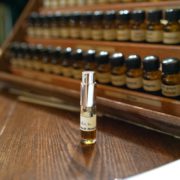Natural Perfumes for Eco-Conscious Consumers
From ancient times to modern tech-savvy civilizations, perfumes have played an essential role in human cultures. In recent years, we have seen a significant transformation in the fragrance market, where a small number of companies are producing eco-friendly perfumes. Eco-conscious consumers are turning to natural perfumes that are crafted with sustainable fragrance materials. It’s not just a trend; what we say is a critical movement to preserve our earth while still immersing ourselves in the luxury of delightful scents.
In this article, we will explore insights into why natural perfumes are becoming the first choice for eco-conscious consumers, along with the evolution, benefits, and future of natural perfumes as sustainable fragrances. So, let’s dive in.
Table of content
-
Introduction to natural perfumes: a sustainable choice
-
What defines a natural perfume?
-
The environmental impact of synthetic perfumes
-
Sustainability and ethical practices in natural perfume production
-
Benefits of natural perfumes for eco-conscious consumers
-
How to identify genuine natural perfumes
-
The science behind natural perfumes
-
Challenges and misconceptions about natural perfumes
-
Conclusion: making the switch to natural perfumes
Introduction to natural perfumes: a sustainable choice
Over time, people are becoming increasingly aware of the growing environmental, health, and well-being issues. Modern research shows that most synthetically produced fragrance ingredients are linked to several serious health hazards, including allergies, skin conditions, and even certain types of cancer. Moreover, these materials are found to be harmful to other animals and the earth. On the other hand, scents made from only natural ingredients have been found to possess significant healing properties and are suitable for the environment.
This is why eco-conscious consumers turn to perfumes made from ingredients responsibly sourced from nature, eco-friendly, and have undergone an ethical production process. The demand for eco-friendly, sustainable natural perfumes is continuously growing.
What defines a natural perfume?
Ingredients used in natural perfumes are sourced directly from nature, such as flowers, leaves, fruits, resins, roots, and other plant parts. The most common ingredients include essential oils, natural resins, botanical extracts, and some animal extracts like ambergris. These ingredients are typically biodegradable and sustainable, making the scent-making process more eco-friendly. Natural perfumes provide a luxurious experience of natural scents without the use of synthetic chemicals.
The environmental impact of synthetic perfumes
With the advancements of the Industrial Revolution, man-made fragrance molecules that have been synthetically produced in the lab became vastly prevalent in perfumery. These synthetic chemicals allowed for longer-lasting fragrances with a broader variety of scent options but at an inevitable cost to both humans and the environment. The creation of synthetic chemicals often involves petrochemicals, leading to serious health risks and environmental pollution. Research suggests that most of these synthetic chemicals have significant toxic and even carcinogenic effects.
Common synthetic and harmful chemicals used in perfumery include:
- Phthalates
- Styrene
- Synthetic musk or white musk
- Lilal (Butylphenyl Methylpropional)
- Cashmeran
- Other synthetic toxic blends
These synthetic substances are difficult to degrade in nature and are detrimental to both the human body and the environment. According to the Federal Environment Agency, these dangerous chemicals can enter the body through the skin or breathing and accumulate across the body, causing severe internal inflammation and allergic reactions.
On the other hand, natural perfumers use natural ingredients such as spices, herbs, flowers, fruits, and resins in their fragrances. Since these natural perfumes rely solely on natural resources, they are much better and eco-friendly than synthetic ones.
Sustainability and ethical practices in natural perfume production
With the growing awareness of health and environmental concerns in recent years, we have seen a remarkable shift towards using natural perfumes. There has been an increasing consumer demand for transparency. Natural perfumes are characterized by using responsibly sourced, sustainable natural ingredients and ethical and eco-friendly production and packaging processes.
By opting for natural fragrances, we can reduce the use of harmful petrochemicals and thus decrease environmental pollution and health risks. Ethical practices also include sustainable sourcing of raw materials, which prevents overharvesting of rare natural sources such as endangered plants and supports biodiversity.
Ethical practices also prioritize animal welfare by choosing cruelty-free testing methods. This ethical approach also incorporates fair trade practices and ensures that the workers and farmers work in a safer ambiance and are paid fair wages.
Benefits of natural perfumes for eco-conscious consumers
Natural perfumes offer enormous benefits for eco-conscious consumers, from health benefits to environmental impact to ethical considerations.
Health benefits – synthetic perfumes contain harmful toxic chemicals such as parabens and phthalates that are linked to several serious health problems like hormonal disruptions, allergies, respiratory difficulties, and even certain types of cancer. Natural perfumes, on the other hand, offer several health advantages. Essential oils possess many therapeutic properties that promote both mental and physical health in many ways. For example, certain essential oils reduce stress, improve mood, memory, and cognition, and promote physical and mental relaxation. Moreover, natural ingredients are generally considered safer for sensitive skin and are less likely to cause adverse effects on the body.
Environmental impact — Using natural raw materials in perfumery reduces the industry’s dependence on petrochemicals and other artificial chemicals. This, in turn, helps control pollution and conserve non-renewable resources, leading to a cleaner and greener world.
Ethical considerations — Sustainable natural perfume practices include many ethical considerations, such as restricting the harvesting of rare and endangered species, animal welfare, and fair trade policies, to name a few, to ensure a better ecosystem and biodiversity.
How to identify genuine natural perfumes
Identifying genuine natural perfumes is quite tricky these days. Read the whole box and look at the label claims. Ask the right questions and look for the correct information. Don’t just look for taglines and keywords; read the packaging label thoroughly and review all the information provided to you, including who the manufacturing company is and what their claims are, as well as ingredient lists.
You deserve to know exactly what’s in the perfumes you’re going to buy. Is there “100% transparency” in the key data provided that will help you make an informed decision? Look for ingredient labels that list all the ingredients in detail without hiding anything by just mentioning categories like “fragrance”, “vegetable wax”, and “color”. A genuine natural perfume house with nothing to hide will provide you with the full list.
Beware of some romantic words that don’t mean all natural. To help you make an informed decision, here’s a list of words we often associate with natural, but they don’t really mean natural at all:
- Clean: The product doesn’t contain certain “dirty” or harmful ingredients. But have they mentioned what they do include? Are there synthetic ingredients in a 100% natural product?
- Phthalate-free: Phthalates are highly toxic, and removing them from products is obviously a good step. But it doesn’t mean the product is also free from other questionable ingredients.
- Pure: it should mean 100% something. But it doesn’t bear any guarantee of naturality.
- Vegan: They don’t include animal ingredients, and synthetic chemicals are also not derived from animals.
- Sustainable/renewable: today, many lab-synthesized chemicals are also renewable.
- Cruelty-free: not tested on animals, good stuff. But nothing to do with nature.
- Hand-crafted/handmade/hand-poured: simply means made by hand. That could be using both natural and synthetic compounds.
Finally, if needed, check the parent company’s website to see if there is any guarantee of naturality or a dedicated page clearly stating what they use and what they don’t in their products.
At La Via del Profumo Italy, you can see our guarantee of naturality with 100% transparency in what we use and what we don’t in our products.
The science behind natural perfumes
Natural perfumes can interact with your body’s chemistry in various ways, including sweat, hormones, skin type, and pheromones. Depending on the key ingredients used, your perfume can react with your body’s chemistry, which can suppress or highlight certain notes and accords.
For example, when mingled with sweat, green and citrus notes become more amplified, creating a unique signature scent that is very personal to your body chemistry. Due to the volatile nature of essential oils, natural perfumes fade faster. In addition, synthetic perfumes use synthetic fixatives to retain their scents for longer. Still, they can produce unpredictable results to the point where one may think, how can a person put such an unpleasant smell on himself?
Challenges and misconceptions about natural perfumes
In the global perfume industry, natural perfumes face tough challenges, particularly when it comes to marketing. Factors like cost and longevity play an essential role. Synthetic fragrances are often gaining an edge in marketing due to their low price and affordability. The labor-intensive process of extracting natural aroma compounds leads to a higher cost, making natural perfumes a premium choice.
But this is not always the case. A number of natural perfumes are also available at affordable prices. However, the benefits are huge. Natural perfumes are worth the investment if we consider all the benefits, ranging from health benefits to environmental impact to ethical considerations.
Conclusion: making the switch to natural perfumes
The rise of eco-friendly natural perfumes represents a noticeable shift in the global perfume industry. Since sustainability is increasingly coming to the forefront for eco-conscious consumers, the demand for ethically sourced, environmentally friendly, natural perfumes continues to grow. By opting for sustainable practices, natural perfumers are making a great contribution to preserving a healthier earth while offering scent lovers guilt-free and luxurious fragrance experiences.
Whether you’re entirely new to this journey or a long-time advocate for sustainability, picking eco-friendly natural perfumes is a step towards preserving a more harmonious and sustainable world.
























Leave a Reply
Want to join the discussion?Feel free to contribute!